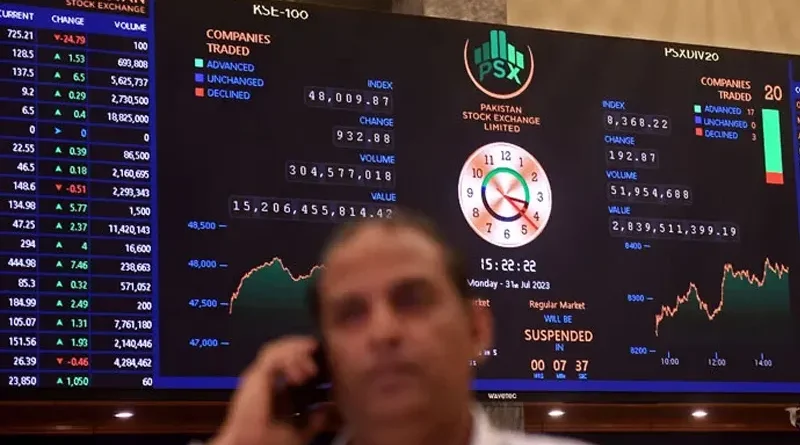Bulls take over as PSX hits all time high
The Pakistan Stock Exchange (PSX) was bullish Thursday as the KSE 100 index recorded a historic high after gaining over 661 points.
At 11:54am the benchmark KSE-100 index stood at 67,208 points compared to the previous session’s close of 66,547.
Arif Habib Limited, a brokerage house, noted in a post on X that the PSX saw an “all time high” when it crossed 67,094 mark which was the previous high on “intraday basis”.
“KSE-100 index went up by 582 points (67,130 pts, +0.87%, on intraday basis) DoD; surpassed its previous high of 67,094 points (on intraday basis),” it stated on X, formerly Twitter
According to experts, the positive trend is reflective of recent economic developments such as Islamabad’s successfully conducted talks with the International Monetary Fund’s (IMF) mission as well as the government’s plans regarding privatisation.
Earlier this week, the privatisation and restructuring plan of Pakistan International Airlines (PIA) was approved by its board of directors which was recently constituted.
Muhammad Sohail, an economic analyst, said the bullish trend reflects the newly elected government’s speedy moves towards privatisation, which is a positive development for investors.
The analyst told that the reason behind the bullish run was the smoothly conducted talks with the Fund’s mission that visited Pakistan in mid-March and the discussion of another programme as well with the global lender.
“Another reason why this has happened is due to a news floating in the stock exchange about Pakistan’s retention in emerging market by FTSE — a United Kingdom based index provider — which increased focus of foreigners,” he said.
Sohail added that Pakistan has received approximately $50 million worth of investment from foreign investors in PSX almost two months after the elections.
Khaqan Najeeb when asked if the government would make any business friendly policies, responded by saying that firstly, there is a stable government which is supported by the strong measures taken by the Special Investment Facilitation Council (SIFC) for the last six months.
Secondly, he added, the IMF programme provides an umbrella to Pakistan to deal with its international gross financing needs — which remains a perennial issue and is heightened at the moment, as the country requires $25 billion every year.
“There is a macro-stability in the country,” he told, adding that it is easier to understand with regards to the build up in reserved and inflation is downward trending, and Pakistan’s current account, even though the economy has been slowed down to manage it.
Commenting on state-owned enterprises (SOEs), Najeeb said that Pakistan has been forced to do something about them.
He spoke about urging past governments to do something about loss-making SOEs. “This is a good push to take us out from PIA and focus towards the energy sector.”
The expert added that foreign interest will turn to Pakistan after FTSE’s status for the next six months. He also spoke about the benefits of other investment avenues in the country such as the property sector, which will also impact the economic trends.
“Overall, it is a good developing picture for Pakistan, if we can sustain it.”

